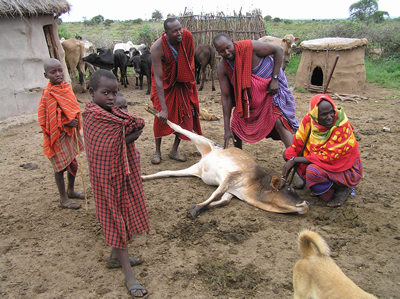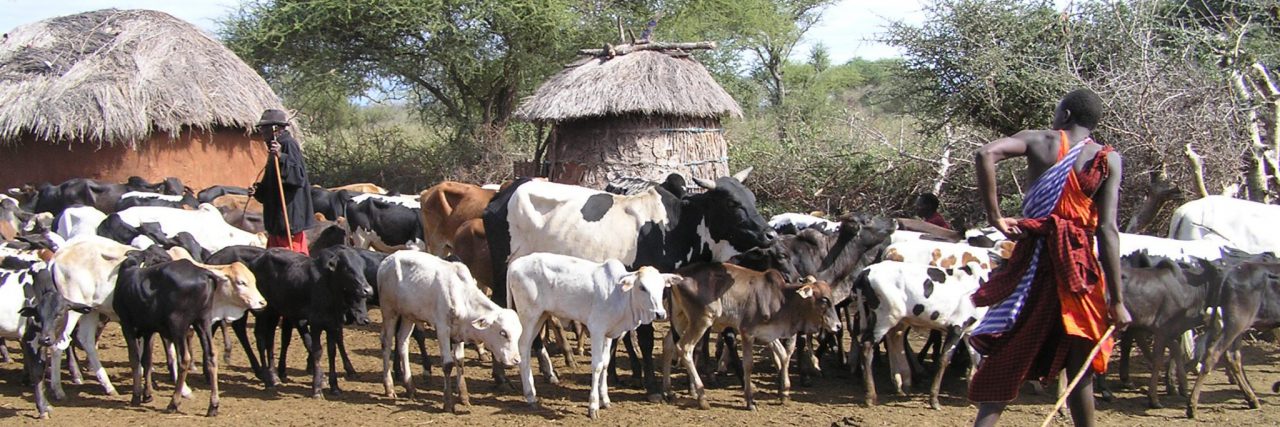Research generated by scientists at University of Glasgow and The Pirbright Institute has shown that a targeted vaccination programme against foot-and-mouth disease (FMD) could alleviate poverty in eastern Africa.
In their study, published in Nature Ecology and Evolution, the team surveyed farming households in Tanzania and examined how the disease passed to livestock, enabling them to understand the economic burden FMD places on local people, and establish the best methods for controlling its spread.
There are several types of FMD virus (called serotypes) that circulate in Africa, but until now the way in which they spread across eastern Africa was poorly understood. Using the virus archives and facilities provided by the World Reference Laboratory for Foot-and-Mouth Disease, Pirbright experts were able to test Tanzanian livestock and wild buffalo to determine which serotypes they had been infected by over the years.

Professor Satya Parida, group leader of the Vaccine Differentiation group at Pirbright said: “We found that FMDV serotypes pass through livestock in slow waves, but that it was rare for livestock to become infected by viruses circulating in wild buffalo. This is different to the situation in southern Africa, where there is spill over from buffalo to livestock and control methods therefore focus on their separation. Our results suggest that these strategies would not be effective in eastern Africa.”
Dr Tiziana Lembo, lead author from the University of Glasgow added: “In East Africa, foot-and-mouth disease control policies targeting the most affected communities have been constrained by a limited understanding of the role of wildlife in transmission to livestock, particularly in areas where both populations live in close proximity. Our research demonstrates that disease risks are driven by livestock- rather than wildlife-related factors.”
The researchers discovered that communities which are reliant on milk as a protein source and for trade saw devastating consequences when FMD outbreaks occurred in their herds due to major reductions in milk production and loss in sales. Households experiencing outbreaks in their livestock typically spent around 25% less on human health, demonstrating the potentially serious effects FMD can have on human health as well as animal health.
FMD eradication campaigns, such as those in South America, have relied on mass vaccination against multiple serotypes to protect against all forms of the disease, but there are currently no commercial vaccines that cover all serotypes in sub-saharan Africa. Through understanding the pattern of FMD waves, the researchers were able to suggest that by quickly identifying the serotype causing an outbreak, serotype specific vaccines could be deployed to prevent its continued spread, thereby providing a cost effective strategy for reducing the economic and health impacts on livestock owners in these regions.
This research was also supported by a BBSRC Doctoral Training grant to fund Miriam Casey-Bryars’ PhD programme at the University of Glasgow.
ENDS
Notes to editors
Research paper: Nature Ecology and Evolution: Waves of endemic foot-and-mouth disease in eastern Africa suggest feasibility of proactive vaccination approaches.
About BBSRC
The Biotechnology and Biological Sciences Research Council (BBSRC) is part of UK Research and Innovation, a non-departmental public body funded by a grant-in-aid from the UK government.
BBSRC invests in world-class bioscience research and training on behalf of the UK public. Our aim is to further scientific knowledge, to promote economic growth, wealth and job creation and to improve quality of life in the UK and beyond.
Funded by government, BBSRC invested £498 million in world-class bioscience in 2017-18. We support research and training in universities and strategically funded institutes. BBSRC research and the people we fund are helping society to meet major challenges, including food security, green energy and healthier, longer lives. Our investments underpin important UK economic sectors, such as farming, food, industrial biotechnology and pharmaceuticals.
More information about UK Research and Innovation.
More information about BBSRC, our science and our impact.
More information about BBSRC strategically funded institutes.


